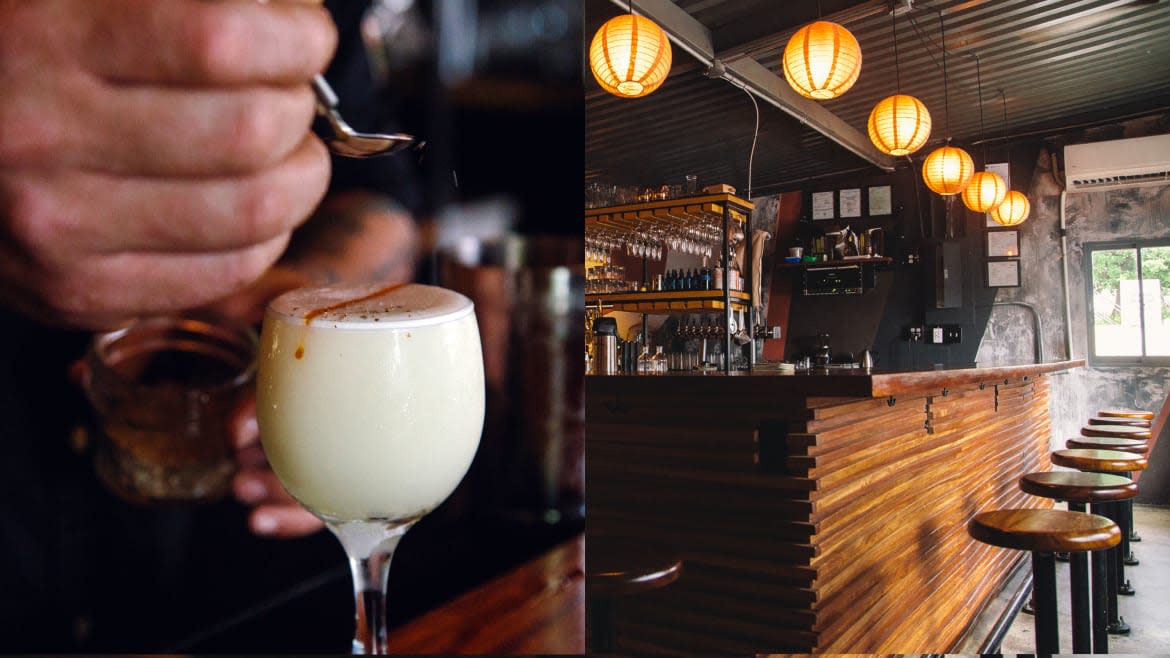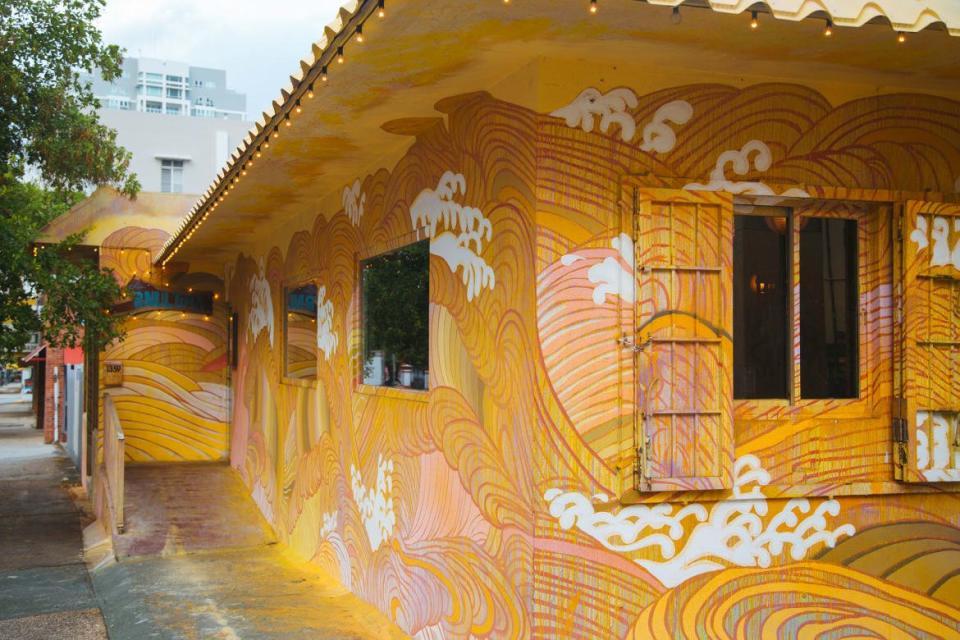The Rebirth of One Puerto Rican Bar After Hurricane Maria

The evening after Hurricane Maria made landfall on Puerto Rico in September 2017, Stephen Hoppe drove to La Penultima, the bar he and his brother, Christopher, had opened 11 months earlier. It was normally a short hop from Old San Juan to the Santurce neighborhood a few miles east, but it took a while longer that night. Like in a real-life video game, he had to double back every so often to avoid downed power lines and toppled trees, and looters he saw emptying a furniture store.
When he arrived, he was relieved—the place had survived mostly intact, save for a toppled passion fruit tree in their courtyard. The tall buildings surrounding the bar apparently funneled the Category 4 winds such that their building escaped the brunt of the damage.
They’d purchased a small, 8,000-watt generator earlier to use during construction. One of the first things Stephen did was to pull it out and power it up to keep refrigerators going and put on some lights, switching out plugs every so often so as to not overtax the power source. “We had to be strategic about what we were running,” Stephen said.
At one point he plugged in their internet router. Why not? And this stunned him: it actually worked—he was connected to the outside world. He would later learn that he was one of just three establishments in San Juan that had working internet.
And that thin line to the outside world, the Hoppe brothers discovered, changed everything. “It’s what really launched us,” Stephen said.

Christopher didn’t plan to open a bar when he moved to Puerto Rico in 2008 — he came to the island with the idea of being a teacher. But he liked the island’s DIY culture, that anyone with an idea and a modicum of wherewithal could create a business. “It doesn’t take much more than hard work to make something happen here,” he said.
When he opened his first spot, a craft beer bar called La Taberna Lupulo, in Old San Juan, he did so without refrigerators to start—he just had some coolers he filled with ice every day. He then opened a well-regarded Thai restaurant called Mai Pen Rai in Santurce. And then he convinced his brother—a furniture maker and part-time bartender in Chicago—to move down and help him launch La Penultima.
They leased a squat, semi-squalid building with a small courtyard that had housed five different business over seven years, including a bakery. “It was a dump,” said Stephen. They gutted it and built out most everything themselves. And when they opened, they quickly became known as a bartender’s bar. “We did a lot of carbonated cocktails, clarified cocktails, and some with liquid nitrogen,” he said.
While they usually opened early each evening, it didn’t get hopping until after midnight, when other bars closed up and industry folks made their way over. It did not have the vibe of a neighborhood bar. “It was novel. People were skeptical of us in the neighborhood—a couple gringos opening a bar,” said Stephen. Their nearest neighbors were a senior citizen complex across the street. “They gave us a lot of side-eye.”
And then came Hurricane Irma, which grazed Puerto Rico on Sept. 6, two weeks before Maria. Although the eye of Irma passed 60 miles north, it lashed the island with 30-foot waves and 110-mph winds. Still, the damage was manageable: the water still ran, and the cell towers still worked. “It seemed the mood in all of San Juan after Irma was pure elation,” said Christopher. “We really felt like we dodged a bullet—it was one of the happiest days of our lives.”
Irma knocked power out for a couple of weeks, so the brothers decided to shut the bar for a time and not rush the repairs and re-opening. “We weren’t that busy anyway, so we thought, why not take a week off?” said Stephen.
The day the power came back on, Christopher happened to board a plane along with some of his employees to attend the wedding of one of his chefs, back north in Minneapolis. It was the Friday before Hurricane Maria blew up seemingly out of nowhere. “On Sunday, that’s when we knew it wasn’t looking good,” said Stephen. Christopher tried to hustle back down from Minnesota immediately after the wedding, renting a car and driving to Chicago to try to catch one of the last flights to the island. It didn’t work out. He was marooned north.
Stephen had stayed behind to re-open the bar after the power returned, but quickly switched gears to preparing for the next hit. He boarded up windows and bolted down everything he could. “And then I just crossed my fingers,” he said.
In a backhanded way, Hurricane Irma had proved a blessing. The interval without power had served as a rehearsal, giving the Hoppes practice in running the place off a small generator. When Stephen got back in to the bar after Maria, he knew what to do. “In the two weeks in between we really figured out a system to get this place powered up on that little generator,” he said. (He was aided by his girlfriend, who had come to visit from New York for a long weekend and found herself unable to get off the island for two weeks. “It was very much a bonding experience,” he said. “We were very casual, and then it went to the next level.”)
Having power, even if scant and intermittent, was a huge boon. They could keep the refrigerators reasonably chilled, and had light when they needed it. They set up grills for cooking in the courtyard, and chefs without generators came by with perishables. “The said, hey, we’ve got all this food, can we come cook it?” said Stephen. One chef came by, cooked up a mess of pork, and then walked the streets handing out sandwiches.
Even ice made with contaminated water proved useful—the senior center across the street could use it for keeping their insulin and other medicines chilled. A sense of purpose pulled the staff all together. “We were just a bunch of rowdy degenerates, but we all took turns to wake up at 4:30 a.m. or 5 a.m. to wait in the lines to get fuel for the generator, and get us through the day,” said Stephen. “What blew me away was the way people come together—the way that people came here to share their food and any resources they had.”
“This was way more than a bar,” said Christopher. “We had a friend who was a barber do a pop-up—he cut people’s hair in the courtyard.” And all this when they couldn’t even sell liquor—for 11 days after the storm, alcohol sales were banned. No one could even buy a legal beer after a sweaty day of clearing debris.
But the most important factor may have been the internet. Thanks to a new fiber optic line they’d had installed, and the fact that the internet provider was just across the street, they could offer a digital bridge to an outside world, where so many locals had relatives fretting on the mainland United States. People from the neighborhood came in with tablets and laptops, and charged their phones on power strips Stephen set up.
Christopher, meantime, had been trying everything he could to get back to the island. He made it to Miami and tried flights from there. He got on one flight three days after the storm and made it halfway to the island, but the flight had to turn back because they lost contact with the island’s control tower. Four other flights he’d booked after that were canceled.
When he finally got on a flight with six huge duffel bags of supplies, 12 days after the storm, he was almost alone on board. Planes were headed south mostly to get people off the island.
The day after Christopher got back to Puerto Rico, the island lifted the “dry law” and beer and liquor started flowing again. The bar was open for business again, as a bar.
But this time, less as a hip, bartender’s bar—although the drinks continue to be innovative and well-crafted. “The cocktail program got less nerdy,” said Christopher. “And we went from being an industry bar to being a real community bar.”
Instead of opening at 6 p.m. each evening, they now open at 11 a.m.. People in the neighborhood stop by for coffee or a drink. “Our clientele now represents the neighborhood,” said Stephen.
Even the seniors, the same folks who once gave them side-eye, have become regulars. “Some of the old ladies who live across the street, they get dressed up and come here for birthdays,” said Christopher. “They order Shaffer Beer on ice with a straw.” Penicillins and Paper Planes are also popular among older Puerto Ricans, they added.
“Maria was a hard thing to get through,” said Christopher. “But we prospered, we thrived through it. If we can do that, there’s so much more opportunity. There’s so much more room for growth in this industry in Puerto Rico right now.
“After the storm,” he added, “I was like, damn, I feel so proud to be here.”

